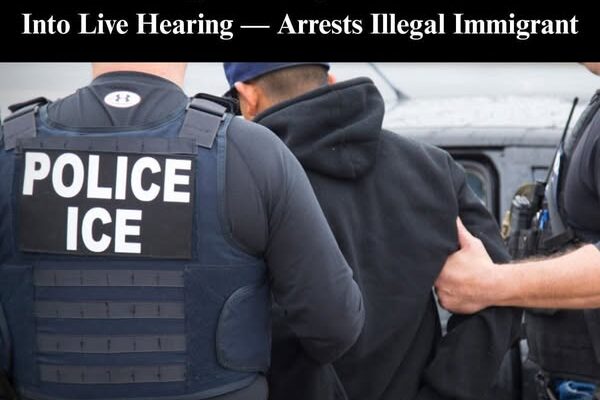Judge Holds ICE Agent In Contempt For Detaining Illegal Migrant During Trial

Boston Judge Holds ICE Agent in Contempt for Dramatic Courthouse Arrest During Trial
A Boston courtroom erupted in controversy this week after a judge found a U.S. Immigration and Customs Enforcement (ICE) agent in contempt for arresting a defendant in the middle of his trial—an extraordinary move that legal experts say violated the very foundation of the American justice system.
ICE agent Brian Sullivan detained Wilson Martell-Lebron just outside the Boston Municipal Court last week, moments after court had adjourned for the day. The timing of the arrest—during an ongoing trial—sparked immediate backlash. On Monday, Judge Mark Summerville ruled that Sullivan’s actions violated Martell-Lebron’s constitutional rights to due process and a fair trial.
“This is a blatant violation of a defendant’s right to be present at trial and confront witnesses,” Judge Summerville declared from the bench. “It doesn’t get more serious than that.”
The judge responded by throwing out the case against Martell-Lebron, who had been charged with making false statements on a driver’s license application. The arrest prompted the judge to file a contempt charge against Agent Sullivan, potentially opening the door to further investigation by Suffolk County District Attorney Kevin Hayden.
Martell-Lebron’s attorney, Ryan Sullivan, called the incident “reprehensible.”
“Law enforcement is supposed to uphold justice, not sabotage it,” he said. “To arrest someone mid-trial—without identifying yourself—and block them from exercising their right to a jury trial? That is a complete miscarriage of justice.”
The arrest, which involved unmarked ICE agents whisking Martell-Lebron into a pickup truck and disappearing before he could return to court, reignited tensions between federal immigration officials and Boston’s local policies. The city has long identified as a “sanctuary city,” restricting local police from cooperating with federal immigration enforcement.
Critics, including former Trump border czar Tom Homan and Republican members of Congress, have slammed Boston’s stance, especially in cases involving immigrants charged with violent crimes. But Mayor Michelle Wu, a Democrat seeking reelection, reaffirmed the city’s commitment to protecting immigrant communities, saying local policies are intentionally designed to resist overreach from immigration authorities.
At the time of the arrest, Martell-Lebron—a native of the Dominican Republic living with relatives in Massachusetts—was being prosecuted when ICE moved in. The trial had just begun, with opening statements underway and witnesses testifying.
“Had ICE simply brought him back to court the next day, we would’ve proceeded,” said attorney Sullivan. “But they didn’t. They disappeared him from his own trial.”
Martell-Lebron is currently being held at Plymouth detention facility for allegedly being in the U.S. without legal documentation, according to the Associated Press.
The clash underscores a broader pattern that emerged during Donald Trump’s presidency, when ICE agents became increasingly visible at courthouses—drawing sharp criticism from local judges and officials. A 2011 policy had limited immigration arrests near sensitive locations like schools, churches, and hospitals. That policy was rolled back under Trump’s administration.
Under current federal guidelines, immigration agents are still allowed to arrest individuals near courthouses if they have “credible information” and are not restricted by local law.
During a two-day contempt hearing, Agent Sullivan testified that both the Massachusetts State Police and prosecutors were aware of the plan to arrest Martell-Lebron in court. State police later issued a statement saying they had acted appropriately, neither assisting nor interfering with the federal operation.
But Judge Summerville’s decision made it clear: stripping a person of their right to a fair trial will not go unchallenged—even in a city caught in the middle of a national immigration debate.



